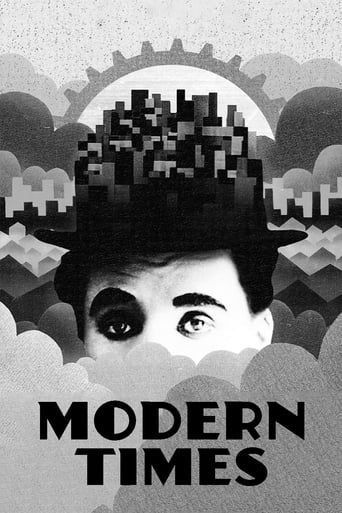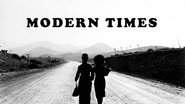Pjtaylor-96-138044
'Modern Times (1936)' is considered to be the last American 'Silent Film', made long after the era had essentially come to a close. It's fitting, then, that some use of sound seeps into the piece and usually signifies the modernisation of society, machines replacing man and bringing audio with them. It also gives us the first taste of The Tramp's voice, as he is forced into an uncomfortable situation simply to find work - though the song he sings is gibberish to keep the scene universally understandable. This picture is perhaps Chaplin's finest silent work because it not only has a message, taking a stance against the industrialisation of the workforce and its replacement by unthinking machines, but is also riotously entertaining throughout. It puts a smile on your face in the first scene and keeps it there until the last. Each slapstick set-piece comes incredibly close to brilliance, with a few easily crossing that threshold, and the feature is funny in the way only a film of this kind could be. It really is effortlessly entertaining and endlessly enjoyable, remaining a purely visual threat from beginning to end with some fantastic themes and inventive scenes. There isn't really a moment that doesn't work and the Tramp remains as endearing as ever. It's made even better because of its underlying point, one that is all the more relevant today and was actually somewhat clairvoyant, and is certainly one of the most purely cinematic pictures I've ever seen. A proper Chaplin classic. 7/10
guedesnino
The fear of Chaplin and his tramp Carlitos is the fear of the common man. The uncertainty of a world that in the measure of its modernity, excludes the individual and the spaces for the human feeling."Modern Times" uses the facet of satire and at certain times of the parody to result in a critical and conscious comedy. It promotes a laughter contained in a world where the population is comparable to a flock grazed by large corporations and corporations, and even being a film scripted and directed by Charlie Chaplin in 1936, has a strong prophetic or futuristic character, timeless and certainly helplessness, when we reflect In the position of the contemporary world.Chaplin in "Modern Times" already philosophized on so many important issues that when reviewing his films, we were amazed by his futuristic vision in terms of technology with surveillance systems monitored by cameras, a mix of reality show with face time, (Such as Skype), voice messaging (WhatsApp), digital recording, and the interference of man's banal activities, such as having lunch, being interfered with by machines and everything to ensure more work efficiency, Wasted time with human activities.In addition to the technological advances, there is in the film, or at least in its first part, an analysis of the effects and reflexes of modernity on man and the world, expressed by relations of subordination and power, by the totalitarianism of business groups and by the inexpressiveness of trade union movements Which result in meager advances and are brutally repressed by the police force. A well-presented paradox in the film is how man has managed to advance in technological modernities that, on the other hand, only increase the differences of social classes, generating groups concentrated by industrial power and a whole mass that is at the mercy of a great employment opportunity Part exploratory and enslaved. Living in miserable conditions, in a daily struggle for survival and without the prospect of a better future, there is nothing left but a passive position of the people, who fulfills their expectations with dreams and fantasies of consumption and a life less unworthy.The critical character of "Modern Times" knows how to measure well the moments of comedy, in fact, they mix in a homogeneous mass so well structured that allows the public, if it so wishes, to stick only to moments of comedy, but if you want, Just look more closely and we can see and see our world through a critical humor perspective. Perhaps the fear of Chaplin and his tramp Carlitos is the fear of the common man. The uncertainty of a world that in the measure of its modernity, excludes the individual and the spaces for the human feeling.Particularly, I believe in an attempt by Chaplin to soften his critical stance, for, in structuring the script of "Modern Times," the story is divided into chapters that resemble chapters, and which can, as a filmmaking feature, be relocated without Major implications, since the dependence of one chapter does not strongly interfere with another. This structure that border the sketch or "sketch", are, in my opinion, a weak and harmful feature to the film. So much that the resolution for this is a passage of days, there are no missing cards that inform the next action (chapter), it occurs ten, seven, five, two days later or within weeks. This division is so explicit that we can structure the film in the following way:Chapter I - Factory; Chapter II - The Prisoner of the Tramp Chapter III - The Life of the Poor Girl;Just in the middle of the movie, we have an unfolding of this critical and political comedy for a romantic comedy that nothing resembles the initial idea proposed to the film. The only vestige that remains of this trait is in the labor relations, the search for a job and a change of life.With the proviso to the slip of his narrative structure, you had a great work, and one more impeccable work of Chaplin. When "Modern Times" was made, cinema already had the sound feature, but Chaplin, mainly for his ideologies of creating a universal art cinema, which was not hampered by differences of languages and other motives, remained faithful to the comic of mimicry , Which made him deservedly famous and admired all over the world.Conversely to those who say of their fear of using the soundtrack, we have in this film a Chaplin conscious of the advances of the sound and that knows to take advantage of that, the sound is presented as a technology that allows the sending of recorded messages, in the sound games like beats In the door that serve to confuse the actions, in the use of a radio to inhibit the sound of the gastritis and where the radio announcer remembers exactly to take the medicine to heal this evil and especially the sound, like match point of the history. If the hobo can not get a joint job, how about trying life as an artist? But for this it is necessary to sing, therefore he who never speaks. The result







